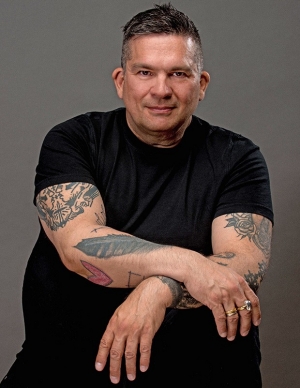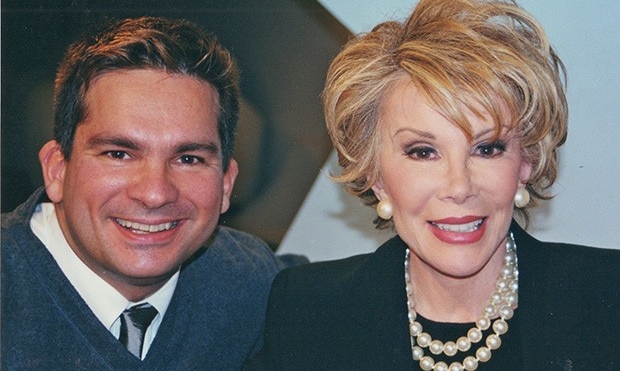After launching Divers/Cité, Deir, in a bid to effect further social change he became the director of La Table de concertation des gais et lesbiennes de Montréal, the LGBTQ political-action lobby group now known as the Conseil québécois LGBT.
Deir also co-founded and co-produced the pioneering and hugely successful Queer Comics series with the Just For Laughs Festival. In 2013 he wrote and — via his production company Boy About Town — produced his first play, Holy Tranity!, one of the top five box-office smashes in the Montreal Fringe Festival’s 25-year history. The French version, Saint-Jude du Village, had a sold-out run at Salle Claude-Léveillée in Montreal’s Place des Arts.
Currently working as a unit publicist on the new X-Men movie now shooting in Montreal, Deir — who was a former teenage rentboy — is also busy writing i.am.rentboy, a documentary theatre piece culled from his interviews with male sex workers.
For his contributions to queer life in Montreal and beyond, Deir has been named one of the grand marshals of the inaugural Fierté Canada Pride Montréal parade on August 20.
Deir sat down for a candid Q&A about queer life in Montreal. (Disclosure: this writer was one of the original organizers of Divers/Cité.)
Why did you start Divers/Cité and what was the community reaction like in 1993?
Puelo Deir: “I started Divers/Cité because nothing was happening in Montreal. My first Gay Pride was in San Francisco in 1992. I was blown away, it changed my life. The next year I went to the queer March on Washington [D.C.]. I was co-hosting Queercorps on CKUT Radio and went to Washington on a media pass and got some insight: How come a great city like Montreal didn’t have a great Pride parade?”
You co-founded Divers/Cité with Suzanne Girard. What are you most proud of?
PD: “At the time there were many ‘community leaders’ who actually were against the parade, even taking bets on how low attendance would be. People — especially at La Table de concertation des gais et lesbiennes de Montréal — questioned why we wanted to create a Pride based on an American model, and asked who were these anglophones trying to do this? It was quite demoralizing.
In our first year, 1993, we drew 5,000 people. Controversially, I was proud of our marketing and how we were able to bring on corporate sponsors. That just was not done in those days. People now get paid to run Pride festivals, but folks forget that back then we did not get paid.
But it was a flourishing time for queer rights, and Divers/Cité put Montreal on the international gay map. Our model was always Sydney Mardi Gras. Because no one in Montreal believed in us, we did our own marketing outside Montreal, and organically grew the festival’s brand around the world.
We had an ally with then-Tourisme Montréal president and CEO Charles Lapointe, who spearheaded a pioneering international campaign to promote LGBTQ tourism in Montreal, based on the amazing success of Divers/Cité and the Black & Blue circuit party.
Essentially, we put Montreal on the international gay map and the city has had a reputation for being a queer mecca ever since.”
You have been involved in many different facets of show biz, from a unit publicist for Hollywood blockbusters, to working for Just For Laughs, to writing and producing your own plays. Is show business a tough place to get queer-themed work financed and produced?
PD: “Absolutely. I don’t think there is an appetite for mass consumption of queer stories.”
Why is it still important for us to promote queer culture and produce queer-themed art?
PD: “If we don’t tell our own stories, nobody is going to tell them for us.”
You have worked with some big stars over the years. Any favourites?
PD: “When I was the head of publicity at Star TV — the E! Channel of Canada — and Joan Rivers had a third or fourth career hosting the red carpet at awards shows, I brought her in to do promotional spots. She showed up with her make-up artists in a stretch limo. I expected her to be a diva, but she was the kindest, hardest-working star I’ve ever met.
She wasn’t getting paid to do this, she did everything that was asked of her, she joked with everybody, she was very generous to me. A truly remarkable and generous talent.”
How about the time you worked with Heath Ledger on the Oscar-nominated film I’m Not There.
PD: “He was not larger-than-life — he was kind, quiet and humble. He hung out with us at bars like Miami and Bobards on Boulevard St. Laurent.”
 Puelo Deir has been an integral player in the Montreal LGBTQ scene for 25 years. | Photo by Johan Jansson
Puelo Deir has been an integral player in the Montreal LGBTQ scene for 25 years. | Photo by Johan Jansson
 Deir worked with pop and queer icon Joan Rivers in 2000 | Photo: Puelo Deir
Deir worked with pop and queer icon Joan Rivers in 2000 | Photo: Puelo Deir